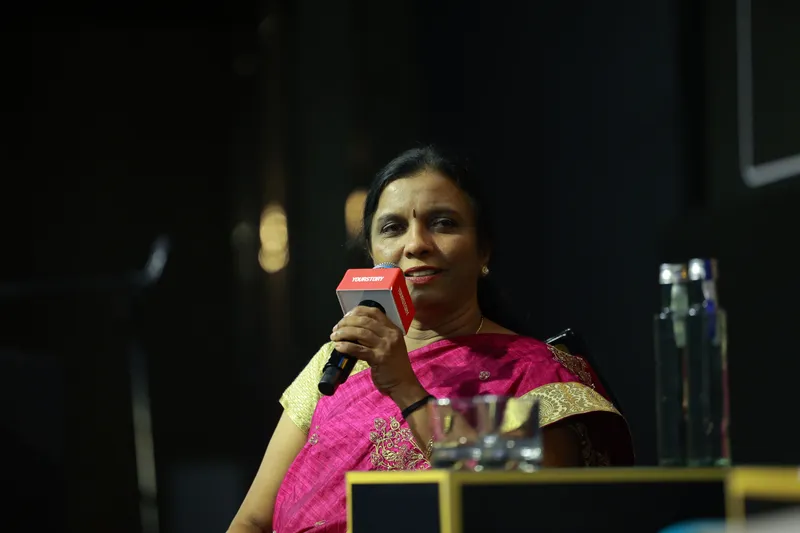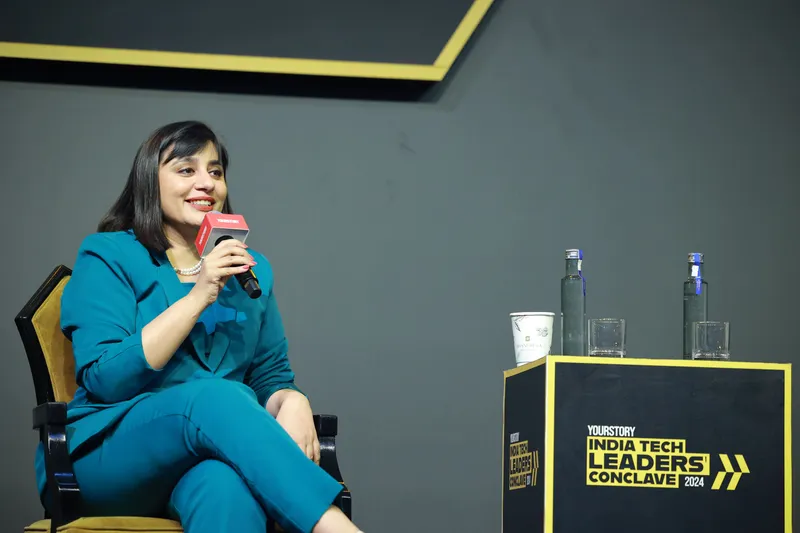Women in tech shed light on AI, data protection, and gender inclusivity at Tech Leaders Conclave
Geetha Manjunath, Founder and CEO, Niramai, and Shivaarti Bajaj, Founding Managing Partner, RSD Bajaj Global Law Firm, discuss women’s role in tech, data protection laws, and gender-inclusive policies at the workplace.
Will AI replace jobs is a question of the past. Using AI tools to make human beings more productive is gaining wide acceptance now, said Geetha Manjunath, Founder and CEO of healthtech company , at YourStory’s Tech Leaders Conclave.
AI tools like ChatGPT have been accepted even by the non-tech community as they help them do their jobs faster and more efficiently, she said.
“AI will make the person much better than what he or she is because of the extra bandwidth and smartness that it gives you,” she said, emphasising, “It's possible that people who are smart enough to use AI tools may replace people who do not use them though they are themselves smarter.”
Shivaarti Bajaj, Founding Managing Partner of RSD Bajaj Global Law Firm, cautioned, “AI is a friend and a foe as well.”
Pointing to the use of deepfakes, Bajaj said many celebrities have been subject to them these days. Deepfakes have made their way into Tier II and III cities as well, where they are being used to exploit girls.
“We are operating under the IT Act and cybersecurity laws which are dealing with deepfakes. There are also new guidelines which have come with deepfakes. There are not very harsh laws. But it is a cognisable offence, very much punishable,” she said.

Dr Geetha Manjunath, Founder & CEO of healthtech company Niramai
Protecting personal data in the digital age
Bajaj also touched upon the Digital Personal Data Protection Act 2023, which aims to safeguard the privacy (data) of individuals in the digital age.
She said all technology companies will be subject to a penalty of Rs 250 crore for misuse of personal data without the user's consent.
Safeguarding personal data is crucial for both men and women, as data is gender-neutral, said Bajaj, adding that the penalties for data breaches should be the same for everyone.
“For misuse of data we have the concept of consent under the Digital Personal Data Protection Act. Companies need to take care of taking the requisite consent in the format and directions given by the laws,” she added.
Sangeeta Bavi of Microsoft on her journey in tech and working on projects from inception to initial success
Gender gap in tech
Addressing the gender gap in tech, Manjunath emphasised that today a fairly large percentage of female students are pursuing science, bachelor's and master's degrees, and PhD. However, once they get into the familial phase of their lives, they are saddled with many responsibilities, including taking care of children and in-laws and ensuring the health of family members.
“There is the social requirement of the lady to do both–manage career as well as household responsibility. This expectation is more on females than their male counterparts. I think some of us are not able to handle both.
“You really have to love what you're doing so that you will also find some space for pursuing your career. Unless the person has the internal motivation, it's very difficult to go on,” she added.
Bajaj mentioned that the government is coming up with many new schemes to boost women-led technology companies.
Creating supportive policies

Shivaarti Bajaj
Bajaj elucidated that the workplace policies framed in the past are primarily aligned towards the majority of the workforce i.e. the men. However, she believes workplace policies are now reaching a more neutral angle.
“Not only women, but even men take a day break. With women harbouring domestic responsibilities, men at least want to contribute to a certain extent now."
Calling 'work from home' “the need of the hour," Bajaj said, “It will solve a larger problem for women.”
Manjunath emphasised that many women returning from maternity leave prefer working from the office, as this allows them to concentrate completely on work.
Niramai, which boasts a 70% female workforce, offers work-from-home options in certain cases.
Manjunath said leaders should try to provide a support system to its employees within the company itself, so that they can contribute to the best of their abilities.
Women returning from maternity leave often need time to get up to speed, she said.
“We coach them, and, then, if they need, we ask them to work part-time for a month or so. You cannot just immediately switch from zero work to 100%. So, we bring them in gradually."
While Bajaj agreed that work-from-home comes with certain benefits, she also believes that there has to be the right mix to accommodate everybody.
“Policy will be the backbone of any corporate or startup trying to get women into the workforce. You will have to put things into place at a policy level for any infrastructure to function in a positive manner,” she said.
Edited by Swetha Kannan







